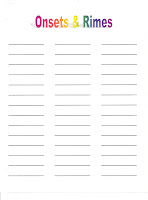A component of literacy development and reading instruction for young children involves the ability to break words into smaller units. This skill falls under the umbrella of phonological awareness which is a broad term encompassing phonemes, rhymes, words, syllables and onsets and rimes.
An onset is the the initial consonant(s) sound of a syllable (the onset in the word cat is c-; of string, str-). A rime is the part of a syllable from the first vowel onwards (the rime of cat is -at; of string, -ing).
In my first grade class I created a game for my students to deepen their understanding of onsets and rimes while having a bit of fun.
I made cards for each of the 49 common onsets and 37 common rimes, and gathered an hourglass timer, a spinner and some paper. Students, working in teams or individually, spin to see if they will pick an onset card or a rime card. Once a card is chosen, the timer is set and students write down as many words as they can that start with the selected onset (ch-, d-, etc.) or end with the rime shown on the card (-at, -ake, etc.).
It is fairly straightforward and simple but extremely engaging.
It can also be adjusted depending on students age and ability. In kindergarten I generally include only onsets with one letter and simple rimes such as -at, -an, -it. In first grade onsets include digraphs and blends while rimes include vowel teams and silent /e/ syllable types.
I have included a sample student sheet (click to embiggen) but it works just as well for students to use a blank piece of paper once they understand the task.
Enjoy!



Nice game. My students have been working on this most of the year. I will have to make something similar. Although I think I would stick min in the pocket chart center.
ReplyDeleteI have a question for you. Do you loop with your students? I think I remember you mentioning last year that you were teaching Kinder and now your in First. Just curious.
Ms. M
Another question. Do you have your kids write down only real words or nonsense words too?
ReplyDeleteAnd I have to share that I did not know "embiggen" was a real word. I was pretty sure what it meant but looked it up anyway. So I learned something new today. :P
Ms. M
Ms. M. - Good memory! I did loop with this class and next year the plan is to teach kindergarten so I can loop again with that class.
ReplyDeleteFor this game I do not allow the children to use nonsense words because that would be too easy and I'm not sure it would be purposeful.
As far as embiggen, I am not so sure it is a real word. Or at least it wasn't. I think it was a word made-up on The Simpsons and has since found its way into our lexicon.
Clever you. Play time is the best way for wee ones to learn.
ReplyDeleteEmbiggen has a certain Colbert-esque truthiness to it. ;)
Hilary - I have learned that you can call anything a game and children will show an interest, even cleaning up the classroom and such.
ReplyDelete